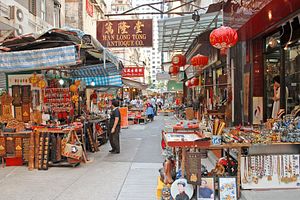Asian consumers led by China continue to express optimism over the economic outlook, defying generally gloomy sentiment around the globe. Yet with confidence souring in Japan as well as Malaysia, the latest Pew Research Center poll has revealed a mixed picture for the region’s growth prospects.
Releasing its 44 nation survey results Tuesday, the Washington-based think tank said publics around the world “remain glum” some six years since the start of the global financial crisis (GFC), with a global median of 60 percent seeing their country’s economy performing poorly.
“Only in developing economies is there some semblance of satisfaction with economic performance: 51 percent voice the view that their economy is doing well,” the center said of its March-June survey. This compares to the glum 64 percent of those surveyed in advanced economies and 59 percent in emerging markets.
Reflecting their post-GFC woes, the publics of Greece, Italy and Spain were the most negative along with those in war-hit Ukraine, with more than 90 percent describing conditions as bad. In contrast, those surveyed in China, Vietnam and Germany were the most positive, with more than 85 percent saying their national economy was doing well.
However, while those in Europe (77 percent), Latin America (74 percent) and the Middle East (72 percent) showed the greatest unease, the least dissatisfaction with general national conditions including economic, political, security and social conditions was shown in Asia, where the figure was 60 percent.
Only in Asia though was there confidence in economic conditions, with 63 percent reporting that their national economy was in good shape. Readings from Europe and elsewhere were negative.
However, there were marked national differences across Asia, with only 35 percent of Japanese and 33 percent of South Koreans reporting good conditions. In contrast, Chinese (89 percent positive) and Vietnamese (87 percent) were upbeat, reflecting positive growth forecasts.
In Malaysia though, confidence in the economy dropped by 13 percentage points, to 72 percent this year, compared with 85 percent in 2013, one of the biggest declines reported by the poll.
While the center said “publics concerned about the economy generally see problems wherever they look,” lack of employment opportunities and public debt were major concerns in advanced economies, while inflation was the main bugbear in emerging economies.
Japan’s growing public debt made it the biggest worry among 67 percent of those surveyed, while South Koreans rated it equally with lack of job opportunities at 58 percent. In contrast, 86 percent of Indians saw rising prices as the biggest concern, as did 85 percent of Filipinos.
Mixed Outlook
Looking ahead, and while forecasters such as the International Monetary Fund expect global growth to improve slightly in 2015 to 4 percent, the global public remains less convinced. The center said a median 46 percent of people expected improved economic growth, with a similar 46 percent forecasting either similar or worse conditions.
The greatest optimism was seen in developing economies, with 57 percent expecting better times ahead, with most in advanced economies (41 percent) seeing more of the same. Among Asia’s optimists, 80 percent of Chinese predicted an upturn followed by 74 percent of Vietnamese and 71 percent of Indians, compared to only 30 percent of South Koreans and just 15 percent of Japanese.
The challenge for Abenomics is shown in the change in sentiment since 2013, when 39 percent expected an improvement – the biggest such jump in six years of poll data. Yet all is not lost for the government of Prime Minister Shinzo Abe, with 34 percent reporting current conditions as being “somewhat good,” eight percentage points higher than last year’s survey and contrasting to the dismal 7 percent who said the same in 2012.
While China’s growth has slowed, the public has remained markedly bullish over the past six years of survey data, with around a quarter consistently expecting the economy to “improve a lot.” At 27 percent, the proportion reporting “very good” current economic conditions was the highest in seven years of data, defying gloomy reports of a housing slump and debt blowout.
The Pew Research Center’s findings compare with the OECD’s Better Life Index, which has consistently rated the citizens of Australia, Norway and Sweden the happiest in its 36-member group.
With the International Monetary Fund expecting the world economy to take a turn for the better in the second quarter of 2014, the prospects for a more positive mood among the global citizenry appear brighter in 2015. Getting the “glass half full” optimism of the Chinese to rub off on their gloomier neighbors in Japan and South Korea could make a big difference to Asia’s readings, however.

































